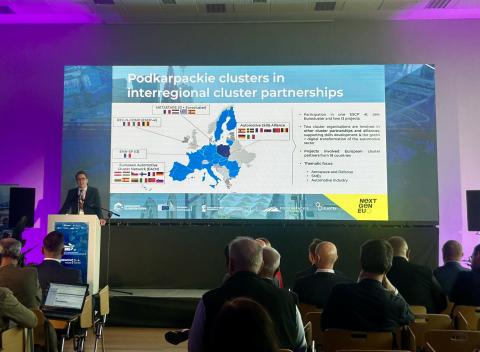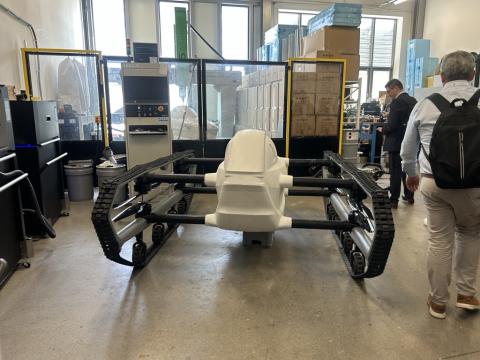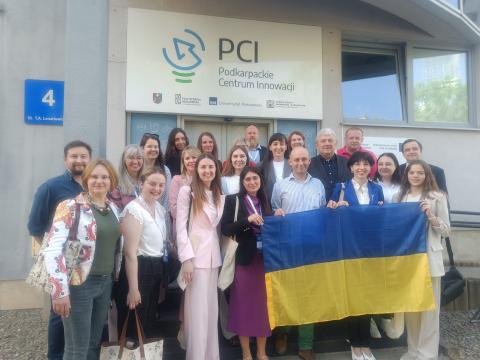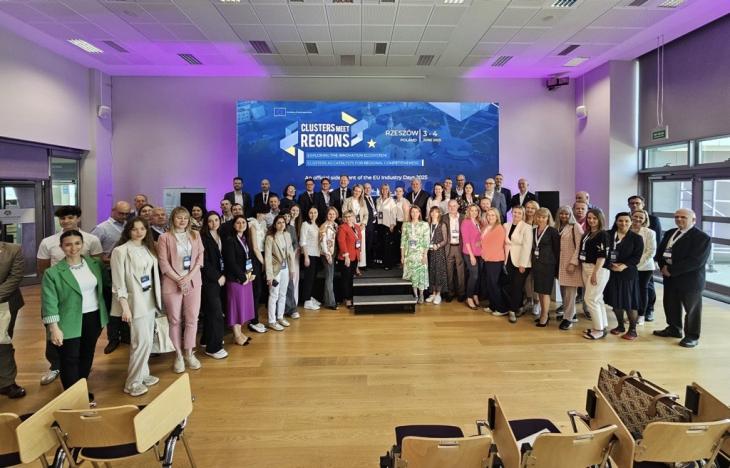Stronger Together: How Clusters are Powering Regional Resilience in Rzeszów
On 3-4 June 2025, Rzeszów took centre stage for an in-depth exploration of how clusters can drive resilience, innovation and economic renewal in Europe’s regions. The Clusters Meet Regions event brought together cluster organisations, policymakers and business leaders to share solutions for sustainable development and enhanced cross-border cooperation. Cluster cooperation is how we transform challenges into shared growth, affirmed Marshal Władysław Ortyl (Government of the Podkarpackie Region), spotlighting Podkarpackie’s global aerospace and defence role and its collaborative heritage.
Participants examined the unique strengths of Podkarpackie—from advanced manufacturing and zero carbon technologies, to drone technology and dual-use innovation. The event highlighted how clusters act as engines of growth and key players in navigating Europe’s evolving geopolitical and industrial landscape.
Organised by the European Cluster Collaboration Platform (ECCP) on behalf of the European Commission, and hosted by the Local Government of the Podkarpackie Region, the event welcomed 142 participants from across Europe and beyond.
Day 1: Regional Solutions to European Challenges
From the outset, Rzeszów showcased Podkarpackie’s industrial strength and collaborative spirit. Mariella Masselink (Head of Unit, DG GROW, European Commission) positioned the region within EU priorities, referencing the Choose Europe initiative and the Competitiveness Compass, with a clear message: “The Commission needs the power of clusters and must cooperate with you to make this happen.”
Natalia Martinez Páramo (Head of Unit for the Single Market Programme – SME Pillar at EISMEA) welcomed participants on behalf of the European Commission, applauding Podkarpackie’s active cluster engagement.
Jan-Philipp Kramer (Prognos AG, ECCP Team) presented the ECCP Input Paper, noting the region’s above-average 27% employment in manufacturing and cluster leadership in the mobility-transportation-automotive (MTA) and aerospace sectors. “Clusters generate leverage by connecting the dots,” emphasised Kramer.

|
The first panel explored the critical role of clusters in driving economic development. Niklas Schilling (European Aerospace Cluster Partnership, Hamburg Aviation Cluster) highlighted Rzeszów’s Aviation Valley as a flagship example: “Smart specialisation strategies cannot overlook aerospace.” Established in 2003 as Poland’s first cluster, Aviation Valley has been instrumental in transforming the region into a national aerospace hub—now home to 98% of the country’s aerospace industry and host to global giants like Boeing, Lufthansa, and Sikorsky.
Throughout the discussion, the geopolitical context remained ever-present. With 80% of humanitarian aid and supplies to Ukraine routed through Rzeszów airport, and Patriot surface-to-air missile systems stationed nearby, the strategic significance of the region was underscored—not only as an industrial engine, but as a frontline contributor to European security.
The second panel turned to the green transition. Moderator Irena Łobocka (Sustainable Infrastructure Cluster) captured the mood: “The energy transition is a team sport.” Speakers like Anna Kozera-Szałkowska (PlasticsEurope Polska) and Prof. Jarosław Sęp (Subcarpathian Hydrogen Valley) illustrated the role of clusters in scaling up innovation and enabling a sustainable industrial future.
Antonio Novo (European Cluster Alliance) summed it up succinctly: “Clusters are all about collaboration,” pointing to their expanding role in developing skills, advancing AI, and shaping Europe’s innovation landscape.
Day 2: Clusters Advancing Dual-Use Innovation and Strategic Resilience
The second day of the Clusters Meet Regions in Rzeszów reached new heights as discussions looked to how clusters are contributing to Europe’s resilience through dual-use technologies, unmanned systems, and innovation-led growth. From aerospace to AI, participants explored how regional ecosystems and SMEs are charting new paths to security and competitiveness.
The day opened with a panel on dual-use innovation, where experts from clusters, industry, and academia addressed how Europe’s evolving security landscape creates opportunities for SMEs. With EU defence spending growing and new procurement targets on the horizon, participants discussed how dual-use technologies can boost both competitiveness and resilience. As Janusz Michalcewicz (EUROTECH Sp. Z o.o.) noted: “Podkarpackie is a real partner for production and R&D – there's a big challenge, but a huge opportunity.”
Sebastian Rynkiewicz (EVOLUMA Industry Cluster) and Bartosz Mielecki (Polish Automotive Group) presented best practices for integrating SMEs into the defence sector through cluster engagement. Davide Magagna (Joint Research Centre, European Commission) underlined that the “security, resilience, preparedness, and strategic autonomy of Europe can start in the regions.”
Attention then turned to unmanned systems and the role of drones in reshaping European and Polish industry. From regional strategy to AI-powered drone design, panellists outlined opportunities and regulatory hurdles. Aneta Łobodzińska (Science-Technology Centre for Unmanned Systems), Sylwester Wyka (Łukasiewicz – Institute of Aviation), and Wojciech Skarka (Silesian University of Technology) highlighted cross-sector innovation and international cooperation as critical to growth. Grigory Rotshteyn (Unisphere Gmbh) reinforced the point: “One company, and one country is too small to support the drone industry. We need to think European.”
During the press conference, the Marshal of the Podkarpackie Region announced plans for a dedicated drone airport and incubator—an ambitious move to accelerate SME growth, job creation, and innovation in dual-use technologies. This underscored the region’s commitment to strengthening its position as a leader in aerospace and strategic resilience.

|
The final panel session addressed the role of EU programmes in directing regional economic growth. Representatives from the European Innovation Council and SMEs Executive Agency (EISMEA), the European Health and Digital Executive Agency (HaDEA), the National Centre for Research and Development (NCBR), and Poland’s Ministry of Funds and Regional Policy discussed funding instruments, implementation barriers, and how clusters can bridge policy and innovation. Dr Ramūnas Kuncaitis (EISMEA) stated, “the ECCP can help in building strategic partnerships, through C2Labs and other initiatives”.
The event concluded with site visits that brought Podkarpackie’s innovation infrastructure to life. At the Technology Incubator of the Podkarpackie Science and Technology Park, participants saw first-hand how research, entrepreneurship, and industry converge to transform regional strengths into economic value. Delegates also visited BECCARII, a pioneering startup leveraging the incubator’s facilities to develop its cutting-edge ‘flying car’—a breakthrough project with promising dual-use applications.
Other participants visited the Podkarpackie Centre for Innovation (PCI), where they saw how the region is bridging academia and industry to foster a thriving innovation ecosystem. The centre supports technology transfer from local universities, helps startups scale, and provides researchers and students with access to advanced equipment and expert guidance. With dedicated platforms for R&D commercialisation, SME support, and hands-on prototyping, PCI is building the foundations for long-term regional competitiveness and entrepreneurship.

|

|
Clusters and the ECCP at EU Industry Days
On 5–6 June, delegates had the opportunity to participate in the EU Industry Days 2025 in Rzeszów, Poland—Europe’s flagship event for industrial policy. The gathering brought together leading voices from across European industry to explore how innovation, sustainability, and resilience can shape the continent’s future industrial landscape.
For cluster representatives, the event offered a valuable platform to reflect on their role in driving regional development and to connect directly with European Commission initiatives supporting SMEs, entrepreneurship, and cross-sector collaboration. Beyond networking, it marked an important step towards broader involvement in shaping industrial policy—ensuring that the cluster voice is not only heard, but actively shaping Europe’s economic future.
Among the high-level speakers was Executive Vice-President for Prosperity and Industrial Strategy at the European Commission, Stéphane Séjourné, who emphasised the need for fewer barriers and greater agility in Europe’s industrial strategy: “The EU is about Opening, Protection and Made in Europe – we need fewer rules and fewer barriers to be more effective, have more agility and more activity.” Clusters—by fostering cross-sector collaboration, accelerating innovation, and facilitating access to international markets—are well positioned to support this vision of a more flexible, responsive industrial ecosystem.
